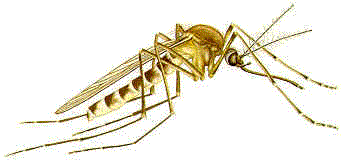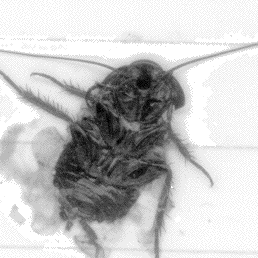

Only about 5% of insects are considered pests. An insect can be a pest if it:
1. Competes with plants, animals, or humans for food and water. An example would be grain moths in your oatmeal, or corn earworms in an ear of corn.
2. Causes damage to plants, animals, humans or structures. Gyspsy moths can strip a tree of leaves, while termites can cause our houses to collapse.
3. If it spreads disease to plants, animals or humans. Mosquitoes can spread malaria and encephalitis to people, and heartworm to dogs and cats.
4. Plain annoys us with their presence! For example, gnats buzzing around your face, or crickets chirping in the basement are more annoying than damaging.
Do you want to get revenge against annoying insects:
Click here for great insect recipes.
Should we use chemicals to get rid of pest insects?
If an insect is a pest, we have many options for controlling them. Most people first think about using insecticides, which are chemicals that either kill or repel insects. Some insecticides are man-made, while others can be made from plants.
There are many benefits to using insecticides to control insect problems. Without insecticides, farmers would lose about 1/4 of our food supply. Food prices at the grocery store and restaurants would go up a lot! Some people may not be able to afford to buy food. Even if they had the money, there might not be any food to buy. The US Department of Agriculture estimates that without pesticides, up to 50 million Americans could starve to death. What food we did have would be full of holes and insect bites. Without insecticides, there would be a lot more disease and damage to our forests.
However, insecticides and other chemicals can be dangerous. These chemicals can poison the person doing the spraying; it can also make people living nearby sick. The insecticides can harm "non-target organisms", such as beneficial insects (honeybees, ladybugs, and spiders, as well as fish, birds, and earthworms. Because of these problems, we should look for other methods to control harmful insects.
What are the alternatives to insecticides?
1). Other methods of control include host resistance, where a plant either tastes nasty to an insect, or makes its own natural insecticide.
2). Sanitation means cleaning up, to get rid of the insect's home or food source. When we drain a bird bath to get rid of mosquito larvae, or wipe up spills in the kitchen, we are practicing sanitation.
3) Biological control means to use a natural enemy of our insect pest. This is where the beneficial insects such as ladybugs, and praying mantids come in. Spiders also help to control insect pests.
4). Cultural control means to grow your plant properly, so it is able to outgrow the damage the insects are doing. We practice cultural control by watering and feeding our plants the right way.
5). The last method of insect control is mechanical. Mechanical control means that we use some sort of machine or device to help either kill the insect, or keep it from bothering us. Roach motels, window screens, and a good pair of Nikes are all considered mechanical control.
